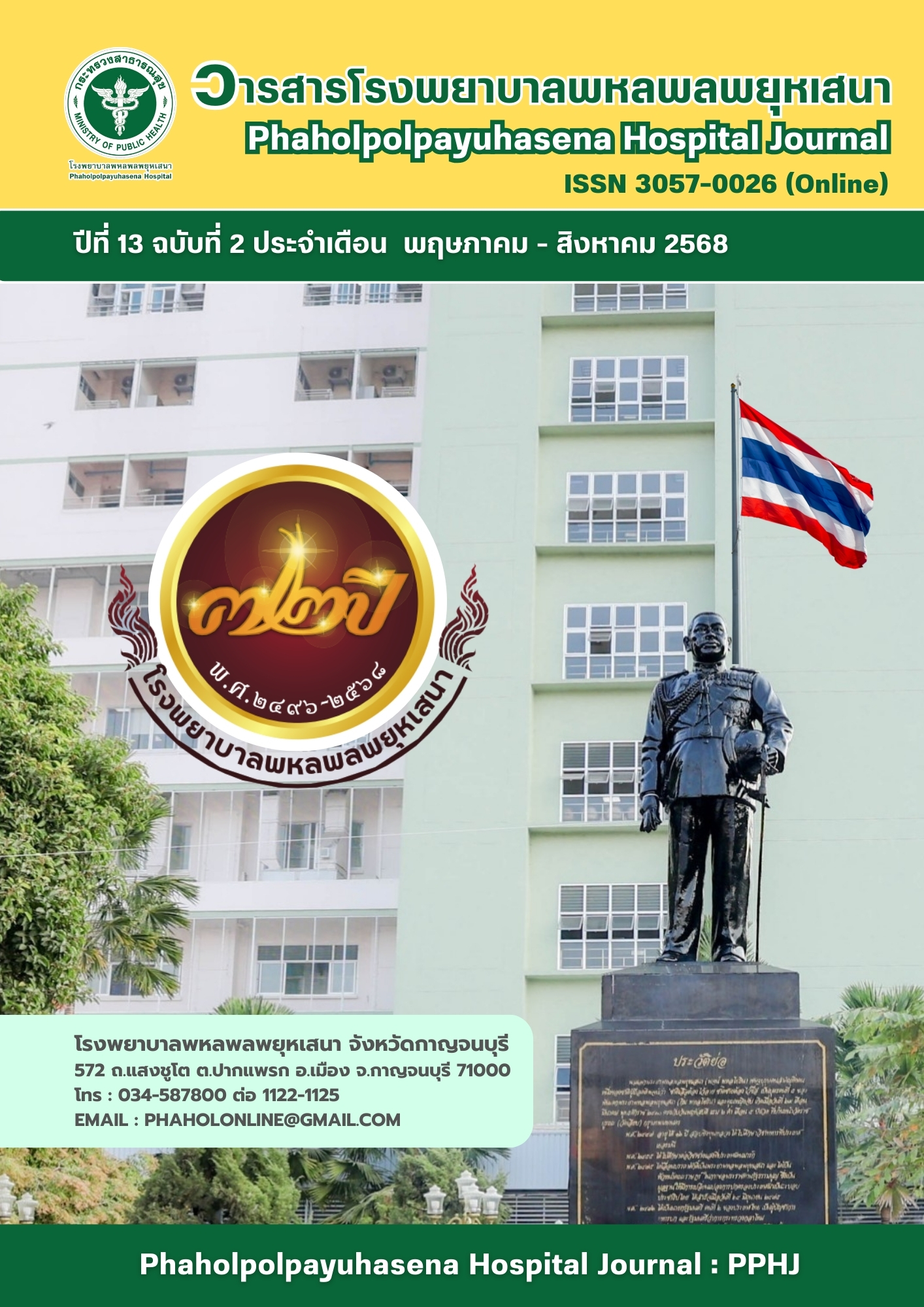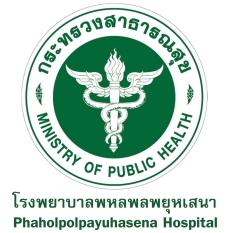Prevalence and Factors Associated with Loss to Follow-up among Outpatient Psychiatric Patients at Phaholpolpayuhasena Hospital
Keywords:
treatment discontinuation, psychiatric treatment, psychiatric patients, outpatientAbstract
Objectives: To study the prevalence and factors associated with discontinuation of continuous treatment among psychiatric outpatients at Phaholpolpayuhasena Hospital.
Methods: This was a retrospective medical record review utilizing an analytical cross-sectional study design. The study population consisted of psychiatric patients who received outpatient services at Phaholpolpayuhasena Hospital in Kanchanaburi Province between January 1, 2023, and December 31, 2023, and met the inclusion criteria. A multi-stage random sampling method was used, with the first stage involving stratified sampling, dividing patients into two groups: new and returning patients, totaling 224 cases. Descriptive statistics were used to analyze general data, and group comparisons were conducted using the Chi-square test and multiple regression analysis.
Results: Among the 224 eligible patients, 62 (27.68%) had follow-up appointments less than once a month, indicating the prevalence of treatment non-adherence. When categorized by follow-up duration, the majority (110 patients, 49.11%) had follow-up appointments exceeding 10 months. Factors significantly associated with treatment non-adherence among psychiatric outpatients (p<0.05), after controlling for age, healthcare rights, diagnosis, patient type, and number of psychotropic medications, were identified.
Conclusion: Among psychiatric outpatients at Phaholpolpayuhasena Hospital, the prevalence of treatment discontinuity was relatively low. A multidisciplinary team should assess the risk factors for treatment discontinuation in individual patients and develop appropriate care plans. Particular attention should be given to high-risk groups, including individuals aged 45–60 years, those diagnosed with schizophrenia or mood disorders, follow-up patients, and those prescribed multiple psychiatric medications.
References
สำนักเทคโนโลยีสารสนเทศ กรมสุขภาพจิต. รายงานด้านสุขภาพจิต (สจ.รง.201) [อินเทอร์เน็ต]. 2568 [เข้าถึงเมื่อ 12 ม.ค. 2568]. เข้าถึงได้จาก: https://dtc.dmh.go.th/
ระบบคลังข้อมูลด้านการแพทย์และสุขภาพ (HDC). ข้อมูลเพื่อตอบสนอง Service Plan สาขาสุขภาพจิตและจิตเวช [อินเทอร์เน็ต]. 2568 [เข้าถึงเมื่อ 12 ม.ค. 2568]. เข้าถึงได้จาก: https://hdc.moph.go.th/center/public/standard-subcatalog/22710ed5db1ed6b12aab540a7b0753b3
Nelson EA, Maruish ME, Axler JL. Effects of discharge planning and compliance with outpatient appointments on readmission rates. Psychiatry Serv. 2000;51:885–9.
Singla M, Goyal SK, Sood A, Philips A, Philips S. Profile and pattern of follow-ups of psychiatry outpatients at Christian Medical College, Ludhiana. J Ment Health Hum Behav. 2015;20(2):76–9.
Lam RW, Kennedy SH, Adams C, Bahji A, Beaulieu S, Bhat V, et al. Canadian Network for Mood and Anxiety Treatments (CANMAT) 2023 update on clinical guidelines for management of major depressive disorder in adults. Can J Psychiatry. 2024;69(9):641–87.
Mitchell AJ, Selmes T. Why don’t patients attend their appointments? Maintaining engagement with psychiatric services. Adv Psychiatry Treat. 2007;13:423–34.
วิชชุดา จันทราษฏร์. สาเหตุและผลกระทบการผิดนัดของผู้ป่วยจิตเวช. วารสารสุขภาพจิตแห่งประเทศไทย. 2554;19(3):149–59.
เพียงบุญพา เนติธรรมกุล. การศึกษาปัจจัยของการผิดนัดในจุดบริการผู้ป่วยนอกแผนกจิตเวช โรงพยาบาลสุราษฎร์ธานี. วารสารวิชาการแพทย์เขต 11. 2565;36(3):1–13
Akhigbe SIMO, Lawani AO, James BO, Omoaregba JO. Prevalence and correlates of missed first appointments among outpatients at a psychiatric hospital in Nigeria. Ann Med Health Sci Res. 2017;4(5):763–8.
เกยูรมาศ อยู่ถิ่น, ดุษฎี อุดมอิทธิพงศ์, กฤตนัย แก้วยศ. ความชุกและปัจจัยที่เกี่ยวข้องกับการไม่มา ตามนัดครั้งแรกหลังการจำหน่ายของผู้ป่วยโรคจิตเภท. วารสารสถาบันจิตเวชศาสตร์สมเด็จเจ้าพระยา. 2561;12(2):27–36.
อำไพขนิษฐ สมานวงศ์ไทย. ปัจจัยที่มีผลต่อการมารับการรักษาอย่างสม่ำเสมอของผู้ป่วยจิตเภท. วารสารสุขภาพจิตแห่งประเทศไทย. 2545;9(3):128–39.
Grover S, Mallnaik S, Chakrabarti S, Mehra A. Factors associated with dropout from treatment: An exploratory study. Indian J Psychiatry. 2021;63(1):41–51.
Ibironke TF, Osasu OS, Omoaregba JO. Prevalence, factors and reasons associated with missed first appointments among out-patients with schizophrenia at the Federal Neuro-Psychiatric Hospital, Benin City. BJPsych Open. 2018;4(2):49–54.
Cheng K, Tsang H, Lin C. Factors related to missed first appointments after discharge among patients with schizophrenia in Taiwan. J Formos Med Assoc. 2014;113:436–41.
Zhang J, Ye C. Factors associated with loss to follow-up of outpatients with depression in general hospitals. J Int Med Res. 2020;48(5):1-9.
Neal RD, Hussain-Gambles M, Allgar VL, Lawlor DA, Dempsey O. Reasons for and consequences of missed appointments in general practice in the UK: Questionnaire survey and prospective review of medical records. BMC Fam Pract. 2005;6:47.
Qaspy H. Psychiatric outpatient services: Origins and future. Adv Psychiatry Treat. 2006;12:309-19.
Chii JC, Hsing-Yi C, Pin C, Hsiu HW. Social support and caregiving circumstances as predictors of caregiver burden in Taiwan. Arch Gerontol Geriatr. 2009;48:419–24.
Che SE, Gwon YG, Kim KH. Follow-up timing after discharge and suicide risk among patients hospitalized with psychiatric illness. JAMA Netw Open. 2023;6(10):e2336767.
Downloads
Published
How to Cite
Issue
Section
License
Copyright (c) 2025 Phaholpolpayuhasena Hospital

This work is licensed under a Creative Commons Attribution-NonCommercial-NoDerivatives 4.0 International License.
บทความที่ได้รับการตีพิมพ์เป็นลิขสิทธิ์ของโรงพยาบาลพหลพลพยุหเสนา
ข้อความที่ปรากฏในบทความแต่ละเรื่องในวารสารวิชาการเล่มนี้เป็นความคิดเห็นส่วนตัวของผู้เขียนแต่ละท่านไม่เกี่ยวข้องกับโรงพยาบาลพหลพลพยุหเสนาและบุคลากรท่านอื่น ๆ ในโรงพยาบาลฯ แต่อย่างใด ความรับผิดชอบองค์ประกอบทั้งหมดของบทความแต่ละเรื่องเป็นของผู้เขียนแต่ละท่าน หากมีความผิดพลาดใด ๆ ผู้เขียนแต่ละท่านจะรับผิดชอบบทความของตนเอง



 Phaholpolpayuhasena Hospital
Phaholpolpayuhasena Hospital
